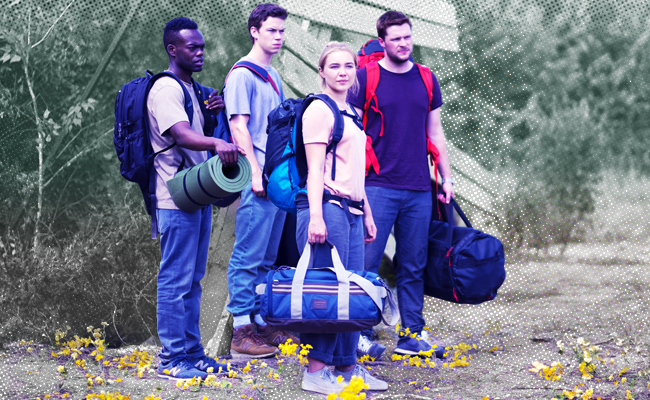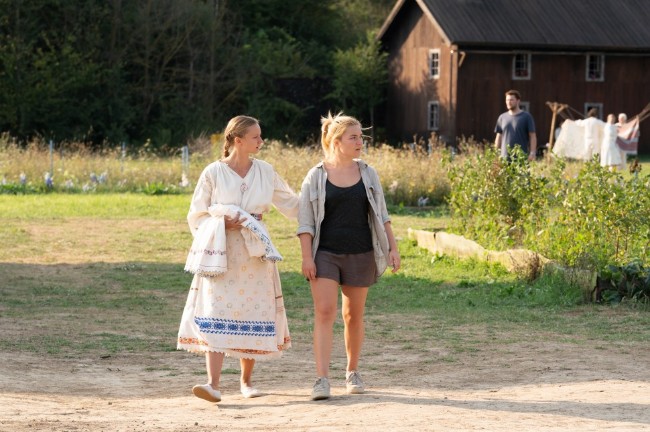
Whenever a new generation comes of age in the west, we get a movie that both inspires them to travel and says something significant about how they do so. By their very nature, these films can’t be period pieces; rather they’re “of the current moment” and created in response to it. They speak to young people — those fabulous yellow roman candles, burning to collect life experience — in a way that passes their audience’s strict authenticity litmus tests. As such, they’re rarely pure travel porn, veering instead toward the humorous, the heartbreaking, or even the horrifying.
These movies offer western travelers a call from distant lands while also forcing them to do a gut check about the world they’re racing off to see. They simultaneously inspire wanderlust and examine it. Easy Rider was this movie for the Baby Boomers. Before Sunrise fit the mold for Gen X. The Beach nailed the travel spirit of the early Millennial crowd (as did Y Tu Mama Tambien). And now we have Midsommar for late-millennials and leading-edge Gen Z.
Ari Aster’s horror/comedy is many things, as the critical dissection it’s received makes evident, but it certainly works as a movie that wrestles with how people from the west leave home in 2019. As a horror, it’s been lauded by Jordan Peele and received an overwhelmingly positive response from critics. As a travel movie, it speaks incisively about what it means to be young and abroad in our current cultural moment.

If you’re willing to look past the ritual murder, reading Midsommar as a travel movie isn’t much of a stretch. The four primary characters are all on the road, far from home, strangers in a far-off land that’s lit by the midnight sun and loaded with indecipherable traditions. Their trip also carries all the hallmarks of any good 2019 adventure abroad — sex, drugs, and a cool-sounding festival.
The specific motivations for this odyssey are murky, but that only adds to the believability. There’s grad school thesis chatter, which is picked up and dropped whenever it suits the plot, but the male leads are far more eager to speculate on who they might have sex with (a line about impregnating Swedish women offers a nice bit of foreshadowing). One of the movie’s best jokes — and the most relatable for any 20-something with itchy feet — is the ever-shifting way that Christian (Jack Reynor), an anthropology student who’s planned this trip with his buddies, talks about it to his girlfriend, Dani (Florence Pugh).
This exchange is pretty standard in the, “I want to take a big trip but I don’t want it to cause a fight” playbook:
MARK: Mr. Pelle’s invited us for an authentic hippie midsummer at his yodeling farm.
DANI: …Oh yeah?
CHRISTIAN: I mean, yeah, we were thinking about maybe — we were talking about it.
DANI: For when?
JOSH: …Mid-June to late July?
MARK: In two weeks.
CHRISTIAN: I mean, if we even go. I probably won’t. We were just talking about it.
Most travelers know that conversation too well to admit. Christian wants to be a “good guy,” especially considering the traumas Dani has endured, but not at the expense of his summer fun. Ever the indecisive Millennial, he eventually invites Dani without telling his friends. Juxtapose that with The Beach, a Generation earlier, where being single in your mid-20s was still a novel idea and the hero, Richard (Leonardo DiCaprio), never pretends to be anything but self-interested. In fact, his personal journey and the killing of the “old self” to discover something new drives the entire movie.
While the outset of Midsommar captures truths about navigating your 20s — the most selfish decade of adulthood — in an era when run of the mill selfishness is often conflated with sociopathy, it’s the scenes with the mysterious Hårga in Sweden that cut the deepest for travelers. They also provide Midsommar‘s closest analog: Borat: Cultural Learnings of America for Make Benefit Glorious Nation of Kazakhstan. The Sacha Baron Cohen comedy of 2006 was genius in its ability to use the American idea of “cultural respect” as a double-edged sword. Watching the guests squirm when Borat behaves horribly at a dinner party gives rise to perhaps the movie’s funniest moment, while watching patrons at a honky-tonk sing along with the words “throw the Jew down the well” offers its most insightful (with the guise of cultural respect allowing people’s own bigotry to shine through).
While Baron Cohen cast light on Americans-at-home, Aster uses similar forces to power the plot of a story about Americans abroad. Much of Midsommar wouldn’t be possible unless its characters were willing to subvert their own ideas of right and wrong in the name of cultural respect. In fact, Christian says as much after two elders pencil dive off a cliff to their presumed deaths, then have their skulls smashed in with mallets.
DANI: Are you just not at all disturbed by what happened?
CHRISTIAN: I mean, of course, it was shocking. But I’m also trying to keep an open mind. It’s — cultural. We put our elderly in nursing homes. I’m sure they find that disturbing.
For me, as a traveler, this is the most important line of the movie. Because Christian is… well… he’s kinda right, right? And even if he isn’t, he’s certainly engaged in a conversation that plenty of Americans are wrestling with right now: when is “it’s their culture” superseded by “it’s just wrong”? Is anything morally absolute?
We — the would-be woke vagabonds — aren’t sure about that one yet. While Richard in The Beach went into the world to find himself, mostly ignoring the Thai locals, modern travelers have a desire to experience other people and their ways of life. That means wrestling with questions about when tradition should be respected and when it’s toxic. In these cases, hypocrisy abounds. Are we opposed to dolphin culling in Japan? What about Indigenous whaling in Alaska? Or wolf culling in Idaho? Naturally, we grapple with all of this over sushi, gorging ourselves on bluefin tuna as the species teeters on the brink of extinction.
Gradually coming to understand the utility of moral relativism, world travelers learn to take these situations on a case-by-case basis (influenced by our own histories and backgrounds) and do our best to make choices we can stand by. The world, we realize, is filled with shades of gray. It’s these shades, and the desire not to abandon a fascinating festival and welcoming community because of a few weird rituals, that keep Dani and Christian with the Hårga and the plot of Midsommar humming.

Rather than creating a truly villainous cult, Aster leaves us with positive takeaways that juxtapose all the murder and choreographed breeding. Does the Hårga’s ceremonial suicide feel a little weird? Sure. But Christian’s line, “We put our elderly in nursing homes. I’m sure they find that disturbing,” isn’t wrong either. The murder and disembowelment of Christian and Dani’s travel partners begins to approach “unarguable evil”-levels (though there is some degree of crime and punishment going on), but the Hårga’s focus on a broadly-defined family unit, their lack of technology in favor of genuine connection, and the deep emotional empathy they show are qualities that often seem lacking back in the United States.
Were they not all subsumed by the cult in one way or another, each traveler would have ended their trip having to unpack what they saw for themselves and decide how they felt about it. So it has always been for anyone witnessing traditions outside of their own while on the road. So it will always be.
***
When I ran all these ideas past Uproxx writer-at-large and Indigenous American Zach Johnston, I expected him to geek out with me on the themes I’d recognized. He didn’t. He just Slacked back flatly. “That movie is so fucking white.”
And you know what? Fair. The movie is pretty dang white. Part of that is due to the fact that it profiles a cloistered cult in Sweden that pays close attention to their Nordic bloodlines, but even among the American travelers featured, three of four are white.
For his part, Aster seems acutely aware of this and turns it from weakness to strength. In Midsommar, Connie and Simon, two non-Americans, both non-white, are the first to ditch the “it’s cultural” excuse and try to leave the Hårga. Why? Presumably, they’ve seen white groupthink and abuse of power wielded before and are quicker to identify its warning signs. Or even just to say, “Do what you want, but I’m not sticking around to watch.” Meanwhile, Josh (William Jackson Harper), the only American person of color in the movie, views the entire series of events through the remove of his master’s thesis. It’s an interesting role for a black anthropologist in a movie about a bizarre white tribe, especially considering how the biased findings of white scientists long poisoned how non-white people were viewed in the west.
Though Josh has a high degree of agency, Midsommar‘s overall whiteness is, sadly, still an accurate reflection of the backpacking/ travel/ travel blogger scene right now. Diversity in travel is a serious issue, tied to the racial wealth gap, systemic oppression, and the overall fact that white 20-somethings feel entitled to see the world responsibility-free while their non-white counterparts often don’t.
Does its whiteness preclude Midsommar from being the defining travel movie of this generation? I don’t think so. But I also hope we won’t have to wait a decade for another iconic travel movie to join its ranks. A movie that explores other potent issues facing young people within the context of leaving home to gain life experience. Race, class, global warming, the failure of capitalism… as long as people strap on backpacks and hit the road, the road will have something to teach us about our world. And about ourselves.






